 Leading Blog | Posts by Month |
 Leading Blog | Posts by Month |
12.31.07

New Year's Resolution: Get Better
WHILE IT IS TRUE that some people just can’t be lead, more often than not, the situation calls for us to get better. Here’s a Taoist story retold in the leadership classic, Leaders: The Strategies for Taking Charge by Warren Bennis and Burt Nanus: When Yen Ho was about to take up his duties as tutor to the heir of Ling, Duke of Wei, he went to Ch’u Po Yu for advice. “I have to deal,” he said, “with a man of depraved and murderous disposition. . . . How is one to deal with a man of this sort?”  Let's all resolve to get better. Let's all resolve to get better.
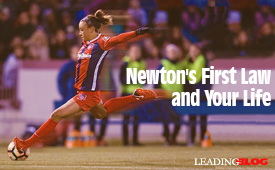 
Posted by Michael McKinney at 12:36 PM
12.27.07

Qualities of Leadership Found in Wordsworth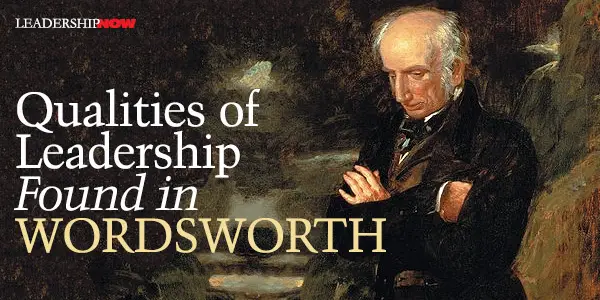
ENGLISH poet, William Wordsworth (1770-1850) wrote in the 1815 edition of his works, what has become a famous preface simply entitled, Preface to Poems. He begins by listing the six “powers requisite for the production of poetry.” Interestingly enough, they make a good list of qualities relating to the practice of leadership. First is Observation and Description. That is “the ability to observe with accuracy things as they are in themselves, and with fidelity to describe them.” Also, to see reality “unmodified by any passion or feeling existing in the mind of the describer.” Second is Sensibility. The more refined our senses are, “the wider will be the range” of our perceptions” and “the more will he be incited to observe objects, both as they exist in themselves and as re-acted upon by his own mind.” Third is Reflection. This quality makes the leader “acquainted with the value of actions, images, thoughts, and feelings; and assists the sensibility in perceiving their connection with each other.” Fourth is Imagination and Fancy. This is the ability “to modify, to create, and to associate.” Fifth is Invention. A quality by which a plan is made “composed out of materials supplied by observation” and are “most fitted to do justice” to the vision. And finally, Judgment. That is “to decide how and where, and in what degree, each of these faculties ought to be exerted; so that the less shall not be sacrificed to the greater; nor the greater, slighting the less, arrogate, to its own injury, more than its due.”
Posted by Michael McKinney at 10:34 AM
12.25.07

Best Leadership Books of 2007 Our selection for the best leadership books published in 2007 are listed below. Learning for the successful person, is a lifelong journey. No book or conference is an end in itself. They should encourage you to dig deeper and more often. These titles do not necessarily represent popularity in terms of numbers of books sold. In a few cases they did not get the recognition they deserved. But all of the titles selected will contain ideas relevant and compelling to leaders at all levels and contexts. The authors all addressed the question, “How can I create the environment and perform in a way that leads to consistently successful outcomes?” But more than that, they deal with the real success of a leader: the creating of a leadership economy if you will—a place where leaders are developed at all levels and in all areas of life. These books will help you on your journey. Again, we have selected a few biographies. As a category, they shape minds and ideas in ways that no other type of business book can. It's a good idea to always be working through a biography of some kind. It gives motivation for much needed self-reflection. To learn vicariously, is perhaps the best way to learn most things.
Posted by Michael McKinney at 09:19 AM
12.21.07

Lou Holtz on Bringing a Team Together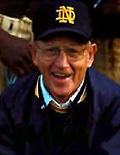 "I want you to learn everything we do at Notre Dame, how we do it, why we do it. It’s important that you learn our methods now so that when you become juniors or seniors you can provide the proper leadership for our younger players. That is essential if we are to enjoy continued success. We did not recruit you to change the University of Notre Dame but to conform to the morals and values of this great institution. You won’t change Notre Dame, but Notre Dame is going to change you.” Holtz reflected that his speech “was establishing a standard, setting a tone from day one. We have all see many great companies and schools fail to pass on their rich traditions to the next generation. They are shortchanging their people. We gave our players something to live up to and few of them ever disappointed us. If your organization or team is performing poorly, perhaps it’s because you don’t ask enough of your people. Never be afraid to demand excellence. But remember, the standards you establish for others must reflect the standards you set for yourself. No one will follow a hypocrite.”
Posted by Michael McKinney at 10:08 AM
12.20.07

Out of Context: Democracy“The people are always said to know best. But the fact that democracies do not like sacrifices, do not listen to bad news nor wish to think about bad possibilities in the future, do not want their comfort or profits interfered with, should be accepted with apprehension, not complacence. Why is it evident that democracy and liberal values will prevail? The evidence is very limited, the historical experience with modern democracy brief, of a little more than two centuries. We do not know the future of democracy." —William Pfaff, The Wrath of Nations: Civilizations and the Furies of Nationalism
Posted by Michael McKinney at 08:56 AM
12.19.07

How To Avoid Making the Wrong Moves: Think Twice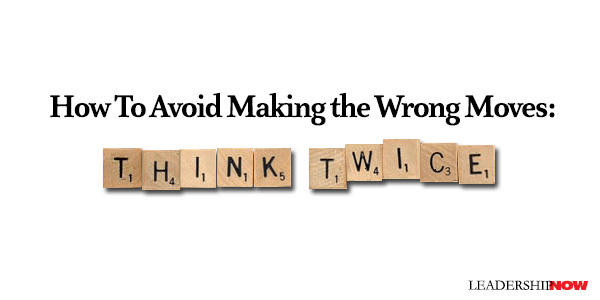
IN their 2008 Investor’s Guide, Fortune magazine offered ten tips to help you “prevent the heat of the moment from melting your better judgment.” The tips form an acronym – Think Twice – and are worth keeping in mind no matter what you’re thinking about.

Posted by Michael McKinney at 08:57 AM
12.17.07

Applied AwarenessIn one of this year’s outstanding leadership books, Apples Are Square, authors Susan and Thomas Kuczmarski interviewed Lambert & Associates vice-president of Client Affairs Brian Sorge about seeing what isn’t there.“Understanding others involves not only paying attention to what they say, but also when they don’t say anything at all,” Sorge believes. “I have always been very emotionally intuitive and that is not easy. I think what happens is that you tend to take on people’s fear and struggles. It allows for tremendous empathy, but also tremendous stress. I remember during speech class in seventh grade, some of the kids would go up there and be so nervous, and I would get tears in my eyes because I could feel their nervousness. I loved getting up and talking to people and giving a speech and I had no problem with it, but I would feel their pain profoundly.” The authors write, “Good leaders take on the problems of the team. They sense difficulties and out themselves not only in the minds, but also the hearts of those around them. This empathy allows them to develop meaningful solutions that impact people on a personal level.” Sorge adds the most important component to all of this: “So many people lack what I call applied awareness. You can give me all the awareness in the world, but you also have to be able to translate that into behavior. In corporate America, it is okay to talk about behavior, but difficult to get beyond talking. That level is not deep enough to make an impact. It allows people to feel like they are changing when they really are not. It is very superficial.”
Posted by Michael McKinney at 10:16 AM
12.14.07

Which Should You Have? Performance Goals versus Learning Goals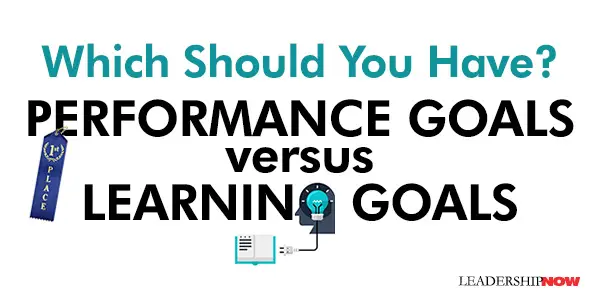
STANFORD UNIVERSITY psychologist Carol Dweck once made a great distinction between performance goals versus learning goals.
Learning goals are ones that are about increasing your competence. “It reflects a desire to learn new skills, master new tasks, or understand new things—a desire to get smarter.” Both goals she noted are common and can fuel achievement. So there’s nothing wrong with either one. “In fact,” she says, “in the best of all possible worlds, students could achieve both goals at the same time.” Unfortunately, we don’t live in the best of all possible worlds. One is usually pitted against the other. “The tasks that are best for learning are often challenging ones that involve displaying ignorance and risking periods of confusion and errors. The tasks that are best for looking smart are often ones that students are already good at and won’t really learn as much from doing.” What she has found is that an overemphasis on performance goals – wanting to look good – can foster a helpless response. In a 1988 study, they found that “many of the students with performance goals showed a clear helpless pattern in response to difficulty. A number of them condemned their ability, and their problem-solving deteriorated. “In sharp contrast, most of the students with learning goals showed a clear mastery-oriented pattern. In the face of failure, they did not worry about their intellect, they remained focused on the task, and they maintained their effective problem-solving strategies. “When children are focused on measuring themselves from their performance, failure is more likely to provoke a helpless response. When children are instead focused on learning, failure is likely to provoke continued effort.” Another interesting tidbit came out of the study. “Some children were told at the start of the study that they had the ability to do really well at the task. Others were told (temporarily) that their level of ability at the task was not so high. For students with performance goals, this message made a real difference: Students who were certain of their high ability were more likely to hold on in the face of failure and remain mastery-oriented. But students who thought their ability was lower fell right into a helpless response.” It made no difference to the student with learning goals. How are we structuring the environment in our schools and organizations? It seems to me we foster environments that encourage and reward levels of achievement and not degrees of learning. In such a case, most people would opt out for performance goals. Who wants to take a chance of being criticized for looking dumb? Are we learning or looking good? Incidentally, an important book by Carol Dweck has been released in paperback. It covers some of this material. Check out Mindset: The New Psychology of Success. 
Posted by Michael McKinney at 08:59 AM
12.12.07

Paul Johnson’s Heroes: Lessons for Today's LeadersPaul Johnson’s Heroes is a pleasure to read. With his knack for illuminative details and command of the language, he has produced a series of short biographical essays that draw you through the book and leave you with a lot to think about. He notes that heroes have not always been appreciated and the status accorded them can be fleeting and arbitrary. By way of example he writes:In the troubled times which followed the end of the Napoleonic Wars, caused by lower wages, unemployment and higher food prices, the term became abusive. When ever the Duke of Wellington made his appearance, a certain kind of London mob (there were many different kinds) would shout: “No heroes! We want no heroes!” For the self-conscious proletariat, the “Man on Horseback” was a political enemy. They threw stones through the windows of Apsley House, the duke’s London residence. He had the windows boarded up but refused to replace the glass, as a reminder to people of how volatile was popularity an dhow fickle the crowd, applauding him as a hero one moment, detesting him the next.Consider too, Genghis Khan was “reviled for nearly a millennium as the archetypal mass murderer and rapist, despoiler, arsonist and ravager” yet “since the collapse of the Soviet empire in Central Asia, has become there a state-sponsored hero, especially in Azerbaijan and Mongolia.” “No people in history were more in need of heroes than the Hebrews.” And so Johnson begins his examples with the judges Deborah, Judith and Sampson leading to their greatest hero, King David. Continuing on, his survey of heroes spans almost 3000 years of Western history and ranges from, Alexander and Julius Caesar, to the unlikely Mae West and Marilyn Monroe, to Lincoln and Churchill, to Ronald Reagan, Margaret Thatcher and Pope John Paul II. Here are some of his comments from the book:
First, an absolute independence of mind, which springs from the ability to think everything through for yourself, and to treat whatever is the current consensus on any issue with skepticism. Second, having made up your mind independently, the ability to act resolutely and consistently. Third, to be able to ignore or reject everything the media throws at you, provided you remain convinced you are doing right. And finally, to act with personal courage at all times, regardless of the consequences to yourself. Who are your heroes?
Posted by Michael McKinney at 08:36 AM
12.10.07

5 Leadership Lessons: Great Advice from Accidental CEO, David Novak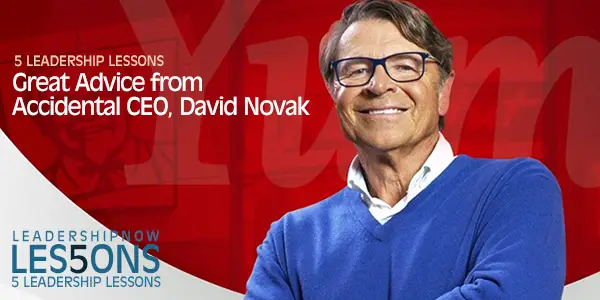
WHILE Yum Brands chairman and CEO David Novak calls himself an accidental CEO, his rise to the top, while perhaps not planned, was no accident. His advancement speaks to the power of right choices made throughout life based on the knowledge gained from cultivating lessons from life and seeking out advice. His memoir, The Education of an Accidental CEO, is written in the first person and full of advice that we can all gain from reading. Nothing here is earth-shaking or new, but it is helpful to see the successful working of these principles in the life of someone who took them to heart. Here are a few of the lessons we can take away:

Posted by Michael McKinney at 10:55 AM
12.07.07

Roger Martin on Assertive Inquiry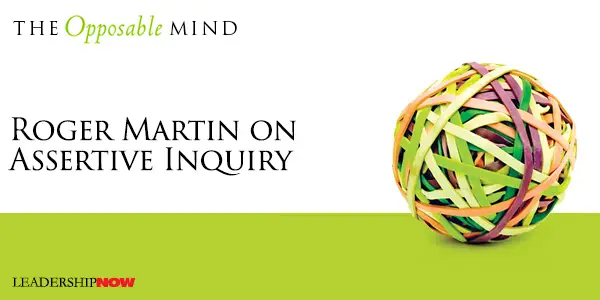 READERS have had some questions about "assertive inquiry" as presented in Roger Martin’s book The Opposable Mind. Here are some explanatory excerpts from the book:
READERS have had some questions about "assertive inquiry" as presented in Roger Martin’s book The Opposable Mind. Here are some explanatory excerpts from the book:
“When we interact with other people on the basis of a particular mental model, we usually try to defend that model against any challenges. Our energy goes into explaining our model to others and defending it from criticism. “The antidote to advocacy is inquiry, which produces meaningful dialogue. When you use assertive inquiry to investigate someone else’s metal model, you find saliencies that wouldn’t have occurred to you and causal relationships you didn’t perceive. You may not want to adopt the mental model as your own, but even the least compelling model can provide clues to saliencies or causal relationships that will generate a creative solution.” Ask:
Not:
Obviously tone is important here. If your attitude is one of really seeking to understand and build bridges, it will come across. Otherwise, it is just another way you’ve picked up to try to argue your point and that will come across too. Martin continues, “Assertive inquiry isn’t a form of challenge, but it is pointed. It explicitly seeks to explore the underpinnings of you own model and that of another person. Its aim is to learn about the salient data and causal maps baked into another person’s model, then use the insight gained to fashion a creative resolution of the conflict between that person’s model and your own.” 
Posted by Michael McKinney at 08:38 AM
12.06.07

Out of Context: Self-Gratification“A society in which self-gratification is the norm is also a society in which there are no longer any criteria for making moral judgments. One feels entitled to have what one wants, whether or not one is worthy. Thus, moral judgments become dispensable. There is no need to differentiate between ‘right’ and ‘wrong.’ —Zbigniew Brzezinski, Out of Control
Posted by Michael McKinney at 09:01 AM
12.05.07

James Kilts on Developing People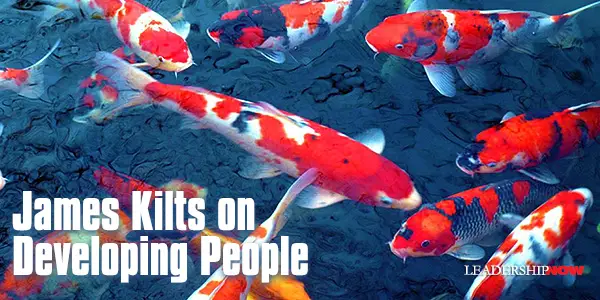
IN Doing What Matters, James Kilts, former chairman and CEO of Gillette Company, shares a story about developing people: One of the most important responsibilities of a leader is to create the right environment and then give the employees development opportunities that enable them to realize their full potential. I like to use an analogy that I heard some years ago of the Japanese carp, known as the koi, to make the point. 12.03.07

Keys to Spotting a Flawed CEO These warning signs reflect a lack of humility. Unfortunately, humility is a characteristic that is widely misunderstood. Consider the comment from Cathie Black, President of Hearst Magazines, quoted on the PINK magazine website. She said, "Humility and modesty are valuable personal qualities, but they won't do much to advance your position in the workplace." If you think humility is synonymous with timidity, weakness, or reticence, then perhaps her comment holds some merit. But that is not humility. Humility is about a proper self respect—neither thinking too highly or too little of ourselves—it is about a healthy respect of other people and teachability; all of which will help you advance in any situation. Michael Watkins wrote in his excellent "guide for new leaders," The First 90 Days, "When a new leader derails, failure to learn is almost always a factor." Other than just not having the know-how to systematically diagnose an organization, he says some leaders have “learning disabilities.” Failure to make an attempt to understand the organization, a compulsive need to take action and preconceived ideas of what is “right,” all stem from a mismanaged ego. Here are the warning signs presented by Dr. Leap:
Posted by Michael McKinney at 12:01 AM
12.02.07

Leadership Books: December 2007Here's a look at some of the best leadership books to be released in December.




Posted by Michael McKinney at 12:01 AM
|
BUILD YOUR KNOWLEDGE


How to Do Your Start-Up Right STRAIGHT TALK FOR START-UPS 
Grow Your Leadership Skills NEW AND UPCOMING LEADERSHIP BOOKS 
Leadership Minute BITE-SIZE CONCEPTS YOU CAN CHEW ON 
Classic Leadership Books BOOKS TO READ BEFORE YOU LEAD |
|